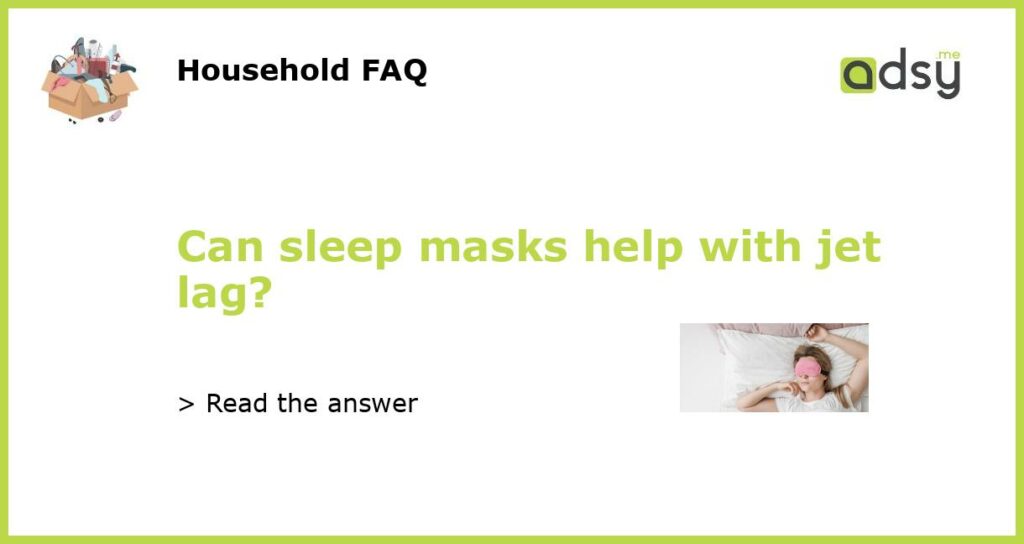Jet lag is a common problem for travelers who cross multiple time zones. It can result in fatigue, insomnia, and difficulty adjusting to a new sleep schedule. One potential solution to combat jet lag is the use of sleep masks. Sleep masks are designed to block out light and create a dark environment for sleep. But can sleep masks really help with jet lag? Let’s investigate.
How Sleep Masks Work
Sleep masks work by covering the eyes and blocking out light. They typically have a strap that secures the mask in place, ensuring that no light can enter. By creating a dark environment, sleep masks can promote sleep and help regulate our internal body clock. Exposure to light is one of the primary factors that signal our bodies to wake up, so by eliminating this stimulus, sleep masks may help us fall asleep faster and stay asleep longer.
Benefits of Sleep Masks for Jet Lag
There are several potential benefits of using sleep masks to combat jet lag:
- Promoting sleep: Sleep masks can create a dark and comfortable environment, making it easier for travelers to fall asleep despite the disruption to their sleep schedules.
- Regulating circadian rhythm: Our internal body clock, also known as the circadian rhythm, is influenced by light exposure. By blocking out light, sleep masks can help regulate our sleep-wake cycle and make it easier to adjust to a new time zone.
- Increasing sleep quality: A good night’s sleep is essential for feeling rested and refreshed. Sleep masks can improve sleep quality by reducing interruptions caused by light and other environmental factors.
- Enhancing daytime alertness: By facilitating better sleep at night, sleep masks can help travelers feel more alert and awake during the day, reducing the impact of jet lag symptoms such as fatigue and grogginess.
Research on Sleep Masks and Jet Lag
While anecdotal evidence suggests sleep masks can be helpful for jet lag, there is limited scientific research specifically focused on this topic. However, several studies have examined the role of light exposure and its impact on circadian rhythm, which indirectly supports the idea that sleep masks may be beneficial.
One study published in the Journal of Clinical Sleep Medicine found that exposure to bright light in the morning can help shift the circadian rhythm and reduce the symptoms of jet lag. Similarly, a study published in the Journal of Physiology and Pharmacology showed that exposure to bright light during specific times of the day can help reset the body’s internal clock.
Although these studies do not directly investigate the use of sleep masks, they highlight the importance of light exposure in regulating our sleep-wake cycle. By blocking out light, sleep masks may offer a similar effect and aid in adjusting to a new time zone.
Tips for Using Sleep Masks Effectively
If you plan to use a sleep mask to help with jet lag, here are some tips to make the most of this sleep aid:
- Choose a comfortable mask: Look for a sleep mask that fits well and is made of soft, breathable material. Ensure that it does not apply too much pressure on your eyes or face, as this can be uncomfortable and may interfere with sleep.
- Use the mask consistently: Wear the sleep mask every time you sleep, including naps, to create a consistent dark environment for optimal sleep.
- Combine with other sleep aids: Sleep masks can be used in conjunction with other sleep aids, such as earplugs or white noise machines, to further enhance sleep quality and reduce disturbances.
- Limit light exposure before bedtime: In addition to using a sleep mask, it is essential to limit exposure to bright light before bedtime. This includes avoiding electronic screens and using blackout curtains or blinds in your sleeping environment.
Sleep masks have the potential to help with jet lag by creating a dark environment that promotes sleep and regulates our internal body clock. While limited research directly supports the use of sleep masks for jet lag, several studies emphasize the importance of light exposure in regulating our sleep-wake cycle. If you plan to use a sleep mask to combat jet lag, it is essential to choose a comfortable mask, use it consistently, and combine it with other sleep aids if needed. Ultimately, using a sleep mask may be an effective and accessible solution for travelers looking to minimize the impact of jet lag.






